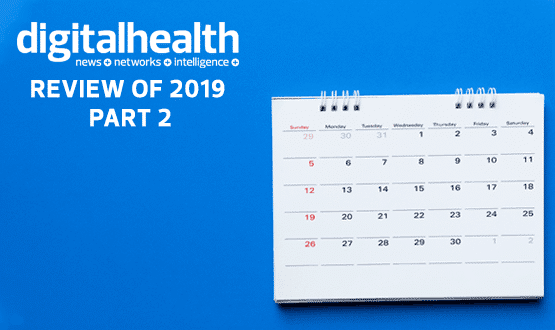As Digital Health continues its round up of 2019, we hit the second half of the year, when NHSX welcomed new appointments, Google amped-up its healthcare ambitions, and the cost the NHS Digital’s restructure was laid bare.

July saw the return of the ever-popular Digital Health Summer Schools, with some 1,500 NHS IT leaders flocking to the University of Leeds to take part in the two-day event.
Summer Schools 2019 included international keynotes from Nick Adkins, John Halamka and Margunn Aenestad; it also saw the launch of the Shuri Network and the return of the coveted Digital Health Awards.
Things weren’t so upbeat over at NHS Digital, however, as Digital Health reported that the organisation had spent some £11m on staff terminations as part of its ongoing restructure.
Twenty-two members off staff received termination payouts of between £100,000 and £150,000, while two received packages worth between £150,000 and £200,000.
Elsewhere, the Digital Health Intelligence 2019 NHS IT Leadership survey found that interoperability remained the highest priority for IT managers, the second year in a row that it topped the agenda.

NHS England published a new section on its Health Systems Support Framework this year to help organisations and integrated care systems get the best value for money when buying new systems and services.
In August, NHS England revealed that Allscripts, Cerner, DXC, IMS Maxims, Nervecentre, Meditech, TPP and System C had been accredited to Lot 1 of the framework.
Digital Health also heard whispers that the NHS’s local health and care record exemplar (LHCRE) programme could lose funding under the Conservative government in order to meet new spending pledges.
Simon Eccles stated on Twitter that the NHS’s commitment to the programme has not changed, although there were suggestions that NHSX may be devising alternative plans for rolling out and extending shared records.
In the start-up scene, Babylon Health secured $454m in fresh investment, catapulting it to the coveted ‘unicorn’ status.

Google Cloud representative Toby Cosgrove made the dubious claim in September that Google was not interested in entering the EHR market – three months before the company unveiled an EHR-like data aggregation tool.
Cosgrove said at the time that incumbent vendors had entrenched themselves in too firmly in the EPR ecosystem to give the tech giant a foothold.
Later that month, Google made our headlines again after it tied up data processing agreements with five NHS trusts, in continuation of it acquisition of AI firm DeepMind in November 2018.
Royal Free London NHS Foundation Trust, Imperial College Healthcare NHS Trust, Taunton and Somerset NHS Foundation Trust, Moorfields Eye Hospital NHS Foundation Trust and University College London Hospitals NHS Foundation Trust all signed data commitments for various DeepMind projects over to Google Health.
Boots also got Digital Health readers talking in September after it launched an in-store video GP service with LIVI.

October wasn’t the best month for GP systems supplier Microtest which had its contract with NHS Wales cancelled after failing to get its software out to GPs.
Microtest had been contracted to deliver its clinical systems to Welsh GPs over a four-year period after being awarded onto Wales’s primary care IT framework in 2018. It was a big deal for the supplier, who at the time had yet to crack the Welsh GP market. Unfortunately, it was not to be, with the chair of Wales GPC labelling the delays “unacceptable”.
NHSX found itself on the receiving end of flak too, when it was criticised for posting a job ad that appeared to exclude BAME applicants.
The organisation posted a job spec for a CIO role which required “proven and significant experience at director level” – which people quickly pointed out would automatically exclude minority groups. The organisation subsequently pulled the ad.
Dominic Cummings’ ties to Babylon Health also hit Digital Health headlines in October.

Google’s previous claims that it wasn’t interested in pursuing EPR opportunities came under scrutiny in November, when it unveiled a clinical dashboard capable of pulling data from various systems into a unified interface.
The system harnesses the tech giant’s search and predictive capabilities to allow users to search through vitals, labs, medications and notes using clinical shorthand, and compare historical trends.
The unnamed product is currently in early clinical pilots.
Up north, Greater Manchester appointed suppliers to its ambitious of connecting up public services across the region.
The Greater Manchester Health and Social Care Partnership (GMHSCP) and the Greater Manchester Combined Authority (GMCA) are working together to invest £7.5m in a digital platform that supports the transformation of public services and empower people to take control over their own health and wellbeing.
It came in the same month that the director of the Great Northern Care Record warned that the culture that led to the failures of the national programme for IT was being carried into NHSX.

Manchester University Foundation Trust (MFT) confirmed that Epic had been awarded preferred bidder status for it’s multi-million-pound electronic patient record (EPR) contract in December, quickly igniting discussions around data sovereignty and architecture amongst Digital Health readers.
MFT begun an open procurement process in August 2018 for a future EPR solution capable of meeting its multitude “specialist and complex needs.”
The contract carries a maximum value of £400m.
Meanwhile, there was scandal afoot as a former chief information and digital officer at Oxford University Hospitals NHS was discovered to have lied about his degree.
Peter Knight admitted one charge of fraud “intending to make a gain, namely a salary” at Oxford Magistrates’ Court.
Knight was chief information and digital officer at Oxford University Hospitals NHS Foundation Trust from August 2016 until September 2018, holding the post while the trust was named a GDE in 2016.
Also hitting festive headlines at Digital Health HQ was news that Agfa had entered talks with Italian supplier Dedalus to sell off its health IT business.

